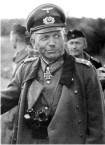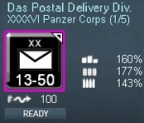Stoat
Posts: 37
Joined: 9/20/2011
From: Toronto, Canada
Status: offline

|
quote:
ORIGINAL: J Boomer
Where do you get that information? While the Canadian Army could have used some more Bert Hoffmeisters it performed quite well despite average leadership. The 3rd Can Div was the only Allied division that came close to completing all its D-Day objectives.
You know for a fact that Panzer meyer though very little of the canadians??? Did you speak to him yourself? I have read more than one account where it would seem he a a grudging respect for the Canadians fighting ability. After all, despite numerous attempts he was never able to break the Canadian line and was forced to withdrawl.
quote:
ORIGINAL: JocMeister
I´m not very well read on the subject but wasn´t the canadian performace a disaster during most of aftermath of D-Day? Mostly because of very poor leadership?
I know for a fact that atleast Panzer Meyer thought very little of the canadians.
quote:
adians??? Did you speak to him yourself? I have read more than one account where it would seem he a a grudging respect for the Canadians fighting ability. After all, despite num
Yah, to summarise Kurt Meyer's views on Canadians expressed in his book "Grenadiers", which I read this year so hopefully can still more or less remember it:
1) Commanders: yah, he thought our leadership was garbage, maybe even worse than Soviet leaders I had the sense, on balance. Consistent failure to exploit obvious opportunities. Didn't understand combined arms warfare. By plodding along, either through lack of ability or aversion to losses, they ended up allowing Meyer to engage at times & places of his choosing, rather than forcing issues where & when he would've been screwed, and caused themselves more trouble, effort & losses by so doing. He mighta thought one guy was OK, forget who, maybe an Armoured Brigade commander, or possibly it was Lt Gen Simonds?
2) Troops: He thought Canadian morale was extremely high. Think he was referring especially to the Infantry. He may have said we weren't quite as wise tactically as his guys but I forget details.
3) Artillery: In particular, he thought our artillery kicked. Fast, accurate, overwhelming. I think the implication is he thought our FOO's (forward artillery observers) were very good & their communications with the guns must've been very good too.
4) Prison Population: he had a very low opinion of our criminals, having been incarcerated alongside the general population (in Halifax?), following conviction in the Canadian Army's only Nuremberg-style show trial, and was greatly relieved when his sentence was commuted & he could finally return to his family.
5) Post-war Canadian Forces: he maintained excellent relations with several Canadian officers, mostly field grade and veterans of the Western Front, throughout and following his imprisonment. Believe he actually volunteered to join the CF (and show us how combined arms warfare was actually _done_), to get out of prison, an interesting offer but this didn't go anywhere.
Panzermeyer was certainly extremely bright, articulate & most capable. I enjoyed the book, which covers his whole wartime career (Poland, France, Balkans, East Front, West Front) & would not hesitate to recommend it to you.
_____________________________
GGWitE = GröKAZ ("Greatest Wargame of All Time") - thx to GG, Company & Community for continuing to make it even better!
|
 Printable Version
Printable Version



















 New Messages
New Messages No New Messages
No New Messages Hot Topic w/ New Messages
Hot Topic w/ New Messages Hot Topic w/o New Messages
Hot Topic w/o New Messages Locked w/ New Messages
Locked w/ New Messages Locked w/o New Messages
Locked w/o New Messages Post New Thread
Post New Thread